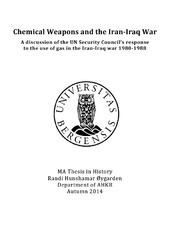Chemical weapons and the Iran-Iraq war. A discussion of the UN Security Council's response to the use of gas in the Iran-Iraq war.
Master thesis
Permanent lenke
https://hdl.handle.net/1956/9153Utgivelsesdato
2014-11-20Metadata
Vis full innførselSammendrag
The Iran-Iraq war was the longest interstate war in the 20th century, and lasted from 1980 to 1988. Iraq estimated that 30,000 Iranians lost their lives because of chemical weapons. Gas had not been used in warfare in such an extent since World War I, but during the Iran-Iraq war chemical weapons were used frequently. The first serious allegations of use of chemical weapons came in 1983, when Iranian troops became victims to poisonous gas. Incidents of use of gas followed the next years until the end of the war, and all signs pointed to Iraq as the violator of the Geneva Protocol, which forbids the use of chemical weapons. How could Iraq use chemical weapons frequently for five years without the Security Council interfering? This thesis therefore discusses the Security Council's responses to the use of chemical weapons in the Iran-Iraq war. The war started a year after the Islamic revolution in Iran, and a year after Saddam Hussein took power in Iraq. Did these events influence the Security Council's responses to the use of chemical weapons? Did other factors, such as political alliances, individual member state's political agendas, financial reasons, or strategic reasons play a part in the Security Council's politics toward the use of chemical weapons? This thesis will look into these aspects, and discuss how the Security Council responded to the use of chemical weapon and what reasons that lay behind their response.
